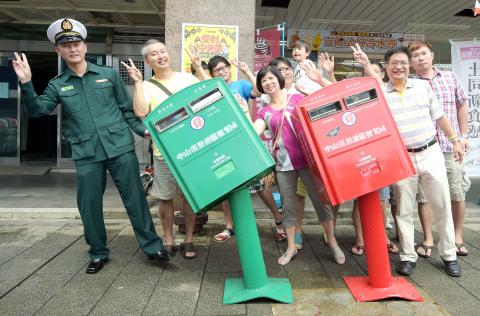Two mailboxes in Taipei have become tourist attractions after a shop sign fell on them during Typhoon Soudelor, with visitors saying they now resemble two people standing next to each other and leaning.
The mailboxes — one red and the other green — are on Longjiang Road (龍江路) in Taipei.
The photos of the two tilted mailboxes quickly went viral, drawing dozens of people to the site yesterday.

Photo: CNA
Many visitors also leaned to the side and posed for photographs next to the mailboxes. Some netizens suggested that the Chunghwa Post Co (中華郵政) keep the two mailboxes as they are, as a reminder of the damage wrought by the typhoon.
Chunghwa Post Co chairman Philip Ong (翁文祺) yesterday said that the two mailboxes would remain at their current location, adding that the post office plans to turn the site into a tourist attraction.
He added that a sign would be set up to the side of the mailboxes informing visitors how they had been damaged by Typhoon Soudelor.
Ong said, however, that the supporting bases of these two mailboxes would need to be reinforced so that they could continue to function as mailboxes. He said that the postal firm could also sell memorabilia related to these tilted mailboxes in the future if visitors continue to show an interest them.

MAKING WAVES: China’s maritime militia could become a nontraditional threat in war, clogging up shipping lanes to prevent US or Japanese intervention, a report said About 1,900 Chinese ships flying flags of convenience and fishing vessels that participated in China’s military exercises around Taiwan last month and in January last year have been listed for monitoring, Coast Guard Administration (CGA) Deputy Director-General Hsieh Ching-chin (謝慶欽) said yesterday. Following amendments to the Commercial Port Act (商港法) and the Law of Ships (船舶法) last month, the CGA can designate possible berthing areas or deny ports of call for vessels suspected of loitering around areas where undersea cables can be accessed, Oceans Affairs Council Minister Kuan Bi-ling (管碧玲) said. The list of suspected ships, originally 300, had risen to about

DAREDEVIL: Honnold said it had always been a dream of his to climb Taipei 101, while a Netflix producer said the skyscraper was ‘a real icon of this country’ US climber Alex Honnold yesterday took on Taiwan’s tallest building, becoming the first person to scale Taipei 101 without a rope, harness or safety net. Hundreds of spectators gathered at the base of the 101-story skyscraper to watch Honnold, 40, embark on his daredevil feat, which was also broadcast live on Netflix. Dressed in a red T-shirt and yellow custom-made climbing shoes, Honnold swiftly moved up the southeast face of the glass and steel building. At one point, he stepped onto a platform midway up to wave down at fans and onlookers who were taking photos. People watching from inside

Japan’s strategic alliance with the US would collapse if Tokyo were to turn away from a conflict in Taiwan, Japanese Prime Minister Sanae Takaichi said yesterday, but distanced herself from previous comments that suggested a possible military response in such an event. Takaichi expressed her latest views on a nationally broadcast TV program late on Monday, where an opposition party leader criticized her for igniting tensions with China with the earlier remarks. Ties between Japan and China have sunk to the worst level in years after Takaichi said in November that a hypothetical Chinese attack on Taiwan could bring about a Japanese

The WHO ignored early COVID-19 warnings from Taiwan, US Deputy Secretary of Health and Human Services Jim O’Neill said on Friday, as part of justification for Washington withdrawing from the global health body. US Secretary of State Marco Rubio on Thursday said that the US was pulling out of the UN agency, as it failed to fulfill its responsibilities during the COVID-19 pandemic. The WHO “ignored early COVID warnings from Taiwan in 2019 by pretending Taiwan did not exist, O’Neill wrote on X on Friday, Taiwan time. “It ignored rigorous science and promoted lockdowns.” The US will “continue international coordination on infectious